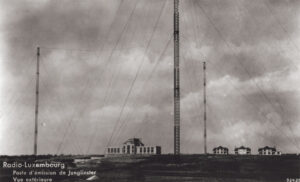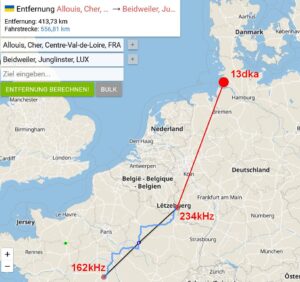Get it while you still can: The Luxemburg-Gorky effect
by 13dka

The Radio Luxembourg longwave transmitter Junglinster in the 1930s [RTL Group]
“In radiophysics, the Luxemburg-Gorky effect (named after Radio Luxemburg and the city of Gorky (Nizhny Novgorod)) is a phenomenon of cross modulation between two radio waves, one of which is strong, passing through the same part of a medium, especially a conductive region of atmosphere or a plasma.” (Wikipedia)
That sounds pretty abstract, right? In my own words, imagine your radio is tuned to a station on let’s say 162 kHz, 500 miles away. Somewhere in the middle between your receiver and the 162 kHz transmitter is a station transmitting on a different frequency, let’s say 234 kHz. The Luxemburg effect is that you can hear the modulation of the 234 kHz transmitter in the middle, on the 162kHz station you are receiving. The effect is not depending that much on the frequency/wavelength though, the longwave station could affect medium wave stations and it has been created using shortwave frequencies far apart.
It was observed first in 1932, when listeners of the Swiss Beromünster 60kW medium wave station built just one year prior also heard a bit of Radio Luxemburg’s longwave transmitter (250kHz) on the Beromünster frequency (653kHz until 1934). Of course this was assumed to be some kind of crosstalk within the receivers and probably drove radio engineers insane until 1933, when Bernhard D.H. Tellegen, a Dutch electrical engineer and inventor suggested the true origin of the effect: The new (1932) 150kW Radio Luxemburg longwave transmitter in Junglinster was directly modifying the ionosphere hundreds of kilometers above, it “heated” the ionosphere in a way that it made the plasma’s charge and reflectivity follow the amplitude modulation of Radio Luxemburg, thus modulating waves of other wavelengths crossing this part of the ionosphere.
Practical demonstration
Even if you’re living in Europe, you may never have witnessed that effect and according to this article by Paul Litwinovich, chances to observe this in the US are rather slim, due to the relatively low power of the stations. I’m in Europe but never noticed it either – until recently: Continue reading

